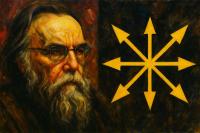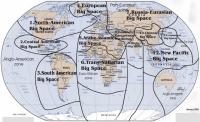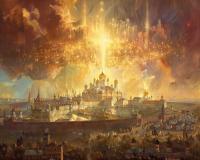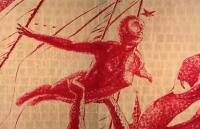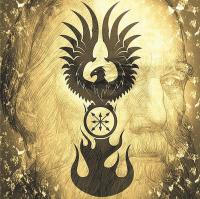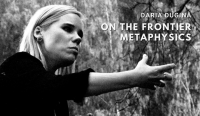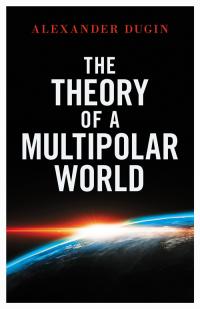4pt
Without the Fourth Political Theory, There Is No America Party
Book Review: ‘Politica Aeterna’
On the question of the Ideology
The Russian ideology
Towards the Fourth Political Theory
What the Japanese Need to Understand the Fourth Political Theory
We Japanese have forgotten many things with the defeat in the war. While some ideas fade away with the passage of time, there are also many that must not be forgotten. To find them, we need to work like miners in a mine, going back and forth between the surface and the underground, searching for rough diamonds deep in the tunnels. This is the role of workers like me.
Civilizational and Cultural Geopolitics Fourth Position
As far as Eurasianism as a Political Movement - especially as a Resistance Movement within countries outside the immediate Eurasian Geopolitical Greater Area and especially within countries under direct Euro-Atlantic domination - there is a connection between Eurasian Geocratic Thought, cultural identity as determinant of the geopolitical camp, with Gramsci's thought of the cultural superstructure as determinant of political relations, Eurasianism as a geopolitical Gramscianism, and Carlo Terraciano's existential geopolitics.
No more ideologies: it is time to choose the Imperium!
The Fourth Political Theory (4TP) is metaphysics of the Imperial Idea. Founded on the reality principle, on the restoration of Natural Law as the manifestation of Divine Order in the world and its natural hierarchies, the 4TP manifests itself as the glorification of the Imperium. The reality of Empire - which is not imperialism - is the ultimate metapolitical and political goal of the 4TP.
Multipolarity as a fact
Multipolarity is a fact and not some falsifiable academic theory, especially by those who obsessively wish for a utopian unipolar hegemony of the USA. Events are running faster than the international system's adoption of the theory of a multipolar world. A theory first introduced into the international debate in its entirety by Professor Dugin, who created a global political movement.
Without the Fourth Political Theory, multipolarism is an empty shell
True! Without the Fourth Political Theory, multipolarism is indeed an empty shell. In fact, if we take away from multipolarism its foundation, the one that has genially idealized and generated it, namely the Fourth Political Theory (4TP), then the multipolar idea will end up being the greatest deception of the 21st century, the double black, the Antichrist of which Alexander Dugin frequently speaks to us in his texts, in his magisterium, in his lectures, in his debates.
Historical Phases of Russian Orthodoxy
The adoption of Orthodoxy by Vladimir, the Grand Prince of Kiev, marked the starting point of the Christian cycle in Russian history, which spans almost the entire history of Russia — with the exception of the Soviet period and the era of liberal reforms. This cycle represents a complex and multidimensional process, which would be inaccurate to describe as a gradual and unidirectional penetration of Orthodox-Byzantine culture into the folk environment, simultaneously displacing pre-Christian (‘pagan’) beliefs.
Hegel and the Fourth Political Theory
For a Metaphysics of 4TP (3): the inner climate of the search for Being in Dasein
The themes related to the movements of the inner search for Being on the part of the Being-us, i.e. of the Dasein, which has realized in itself the consciousness of the reality of Being and seeks to attain it, to experience it in itself or to welcome it through its inner openness, to transfer to it, to identify with it, or otherwise, these are multiple themes that for the most part are not clearly identifiable and often, like the air one breathes but cannot see, fail to be crystallized in a critical reflection, as they lack the reality of being an experienced induction before becoming a reflexive deduction.
For a metaphysics of 4PT (2): 'side thoughts' on Dasein, Sacred and Soul
For a Metaphysics of 4TP: contributions to the Interiority of the Radical Subject
It is not up to us to choose the actual time and manner in which a Radical Subject, from a human aspiration of an existential order and consequent intellectual adherence to the values and truths preached by the Fourth Political Theory, can transform and transfigure itself into a concrete metaphysical and spiritual human reality that in its essence is res of a mystical-eschatological order.
Greeting of African russophiles: Russia-Africa Forum
IS THE FOURTH POLITICAL THEORY JUST ANOTHER IDEOLOGY?
The Fourth Political Theory (and Eurasianism as its geopolitical - geocultural field of application) is not another ideology, nor an ideological synthesis on the existing ideologies of modernity, such as, for example, National-Bolshevism. This would imply that it is nothing but another subjectivity of Modern rationalism. The Fourth Political Theory is a broader political thesis-expression belonging to a deeper layer of political philosophy, as Professor Dugin described it very graphically in the book “Political Platonism”.
On The Frontier Metaphysics
Metaphysics of War
Today I would like to share my views on the metaphysics of war and the philosophical comprehension of what is happening. Without such comprehension, we will not be able to grasp the full depth of the current confrontation. It goes without saying that I am carefully watching the information space, commenting on it live. However, today I would like to have a look at the current events from a philosophical perspective.
The Catastrophe of Platonism (Idea and Representation)
Here we can draw a parallel with the biblical subject of the appearance of the snake in the earthly paradise. It would seem that heaven, Adam, and Eve abide in bliss and abundance; but even in this beautiful and fresh world, forces of coming misfortunes already make themselves known. And even before then, even at the dawn of Creation, when order is first being created and all creatures are close to God, the first of the Angels, of the entities of light, of the ministering spirits, rebels and is overthrown into the abyss with his supporters. From this abyss he later percolates into the earthly paradise. And at the end of times his power will be extended over the world, over the cosmos. But the devil, evil, the presage of the end, appears already in the first pages of the sacred history of the World. In a cloudless, happy heaven his supple body twines around the forbidden tree of the knowledge of good and evil and tempts Eve to try the fruits. Likewise, within the first Beginning, in the situation of the highest tension of spiritual forces and the "heavenly" primordial philosophizing, the great pre-Socratic jump, when philosophy, becoming ontology, still hesitates in indecision [over] how to interpret the being of beings, the end is already drawing near. This "first end" is an end within the first Beginning. Heidegger never regarded this end disdainfully, lightly, arrogantly, contemptuously. He honoured it and was delighted by it, because it was indeed something great. Even in error and delusion there is sometimes scale and scope worthy of veneration.
The Theory of a Multipolar World
Alexander Dugin’s The Theory of a Multipolar World is a cheerful and optimistic view of a future in which humanity will reach its highest development. However, it will not be the uniform humanity pictured by the globalizing and leveling schemers and manipulators. Instead, old artificial borders will be dissolved and new natural divisions installed. Mankind will blossom in its manifold manifestations, namely the distinct civilizations and the ethnoses that breathe their souls into them. Drawing from a variety of philosophies from both the Right and Left, Dugin maps out the immediate goals and ultimate vision of this theory, and what is required to implement it.
Nationalism in the Third World & the idea of a Fourth Political Theory
The anti-imperialist struggle, in political contemporaneity, possesses a radically third-worldly, patriotic, anti-systemic and multipolar characteristic.
The political blocks underlying the current conflicts do not consist of all those old ideological blocks which used to dispute hegemony during the Second World War and, subsequently, during the Cold War anymore. Said in a different way, politics in concrete, today, is not expressed anymore through a tri-partition between American liberalism, Soviet communism and Italo-German fascism, and much less between a dual division between a capitalist block and a socialist block.
Fourth Political Theory and Socialism in Latin America
In the last two months of 2020, we have participated in several collaborative instances with intellectuals and activists from the anti-imperialist struggle around the world. On November the 19th, as a representative of the Circle, I exposed in the international conference “Multipolar Alternative for Latin America: Geopolitics, Ideology and Culture” (Alternativa Multipolar para América Latina: La Geopolítica, La Ideología, La Cultura). In such occasion, and exposing the topics which I already had addressed in my text: “The Fourth Political Theory or a Thinking for Latin America”, I was able to appreciate many good lectures such as the ones from Vicente Quintero (Venezuela), Pavel Grass (Brazil), Nino Pagliccia (Canada/Venezuela), Valerii Korovin (Russia) among many others, and coinciding with them in many viewpoints. Professor Alexander Dugin’s lecture standed out in which he made the unmissable invitation to the peoples of Our America in order to address its problematiques from the Fourth Political Theory (4PT), this time making a proposal to think a new kind of Socialism, which would distinguish itself from the older one and also from the liberal left (“liberal-bolsheviks” as they are being called with some sarcasm).

